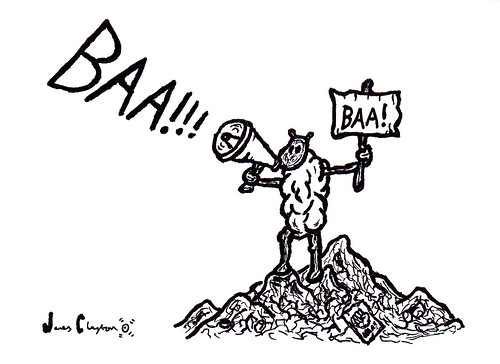Hi everyone!
Speech always has a purpose. We speak to communicate ideas. Great orators know how to use silence, volume, intonation, and body language to capture their audience’s attention. However, when you get right down to it, the words matter. They matter a lot! “Baa” whether spoken or written, just doesn’t resonate with me – you know?!
I’m about half way through the Ong text at the moment and what has fascinated me the most is the way people memorize songs and texts in a purely oral world. Not having read Homer (a victim of technology’s impact on my attention span?), I’m wondering what the actual formulae for memorized passages look like – OK, sound like. What a skill! Can you imagine being able to tell a story like The Iliad from memory? I can hardly fathom reading it! But then, I’m looking at the task from a post-printing press mentality. I’d be thinking about memorizing the thing word for word – apparently a feat not considered an accomplishment in Homer’s time, or even really considered at all.
I’m reading a story to my youngest at the moment called “The Thief.” We just read a bit tonight about how the traditional oral tales of the gods change over time as they are passed down through generations. The “professor” in the story has the gall to suggest that he knows the real version of the story and gloats over the fact that the story the boy’s mother told him has been debased from the original. If I understand Ong correctly, it’s not possible to have an original oral “text” since it is told in a formulaic format. How interesting that my school and parenting worlds should collide over something as uncommon as orality and literature…
I’m Jennifer Stieda. I live in the beautiful semi-desert city of Kamloops in British Columbia, south western Canada. I’m married to a very patient husband with whom I share the joy of raising two gorgeous girls, aged 10 and 12, one of whom loves to read while the other loves to talk! Outdoor sports are my usual pursuits when not METting, including mountain biking, cross country skiing, running, hiking, camping, and canoeing. Kamloops is the perfect place for my lifestyle since we are just hours away from the truly incredible Rocky Mountians, the coastal grandeur of Vancouver, and the orchards and fresh water lakes in the Okanagan Valley. Not to mention having pretty nice trails right out my back door!
Looking forward to working with everyone!
Jennifer
Ong, W. J. (2002). Orality and literacy: The technologizing of the word. New (2nd Ed.) York, NY: Routledge.
Whalen Turner, M. (1996). The thief. New York, NY:Harper Collins.




Hi Jennifer,
Nice to meet you again!
Your passage on orality and originality reminded me that oral tradition in Croatia has been preserved in some way – folk songs that people sing even today. Most of them have pretty much standardised text, but there are usually some variations.
Hi Jennifer,
Great pic. Did you google “baa” to find it? :-D
I am living in a culture of oral tradition so I find your comments interesting. Many of my students’ parents are illiterate and therefore family history and traditions have been transmitted orally over generations. It will be an interesting topic to discuss with them as I delve deeper into this course.
I hope you find some time to enjoy the great outdoors! Kamloops sounds like a great place to live!
Danielle